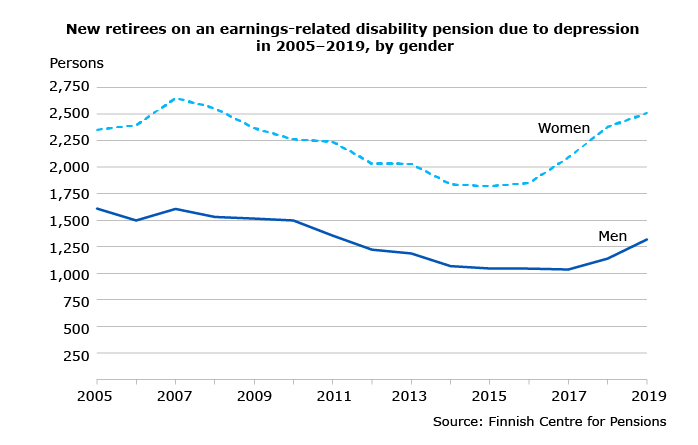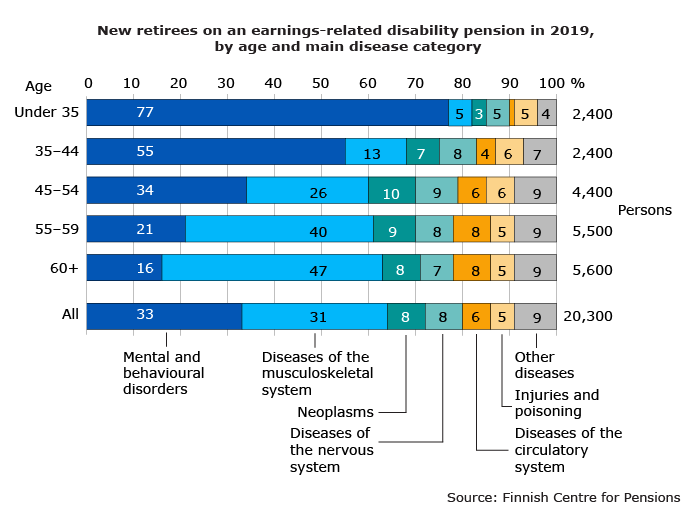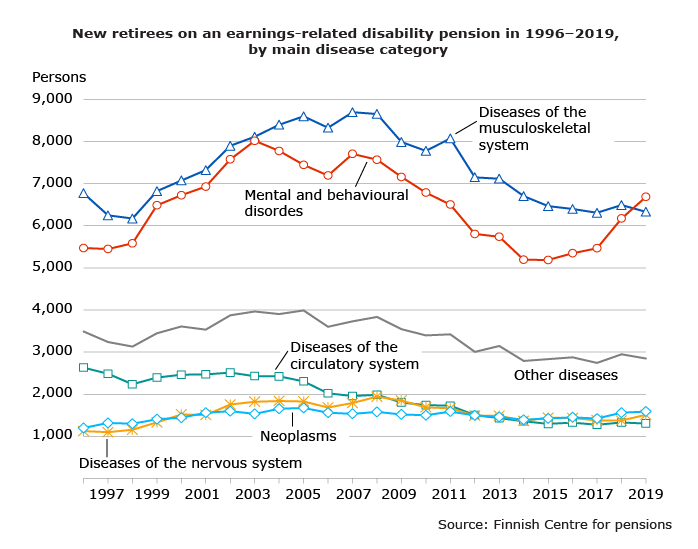Mental disorders the most common reason for retirement on a disability pension

For the first time, mental disorders surpassed musculoskeletal diseases as the main cause for retirement on a disability pension. Disability pensions granted for mental disorders increased clearly in 2016. Depression has become a particularly common reason for retirement on a disability pension for women who are young or nearing their retirement age.
The number of new retirees on a disability pension took an upward turn in 2018 after a ten-year-long positive trend. In 2019, nearly 20,300 persons retired on an earnings-related disability pension. This was slightly more than in 2018.
Disability pensions granted due to mental disorders has increased particularly much since 2016. For the first time, new disability pensions granted based on mental disorders (33%) exceeded those granted based on musculoskeletal diseases (31%) and became the most common cause for retirement on a disability pension.
“This can be considered a historical change. The number of disability pensions granted based on mental disorders has grown by 25 per cent since 2016”, says statistics manager Tiina Palotie-Heino (Finnish Centre for Pensions)
Two thirds of new retirees due to depression are women
The average age of the new disability pension retirees was 52 years. A slight majority (54%) were women. The gender difference is emphasised when we look at new retirees diagnosed with mental disorders. Three out of five of them are women.
Depression has been the largest single mental disorder that has led to retirement on a disability pension already for a long time. In 2019, a total of 3,862 persons retired on a disability pension for that reason. The number has grown by one third since 2015.
In recent years, the number of disability pensions granted due to depression has grown significantly among women under 35 years and over 60 years. For a long time, this diagnosis was most common among women aged 45–59.
Depression seems to be a disease women are prone to suffer: two out of three new retirees on a disability pension in 2019 were women. Their average age was 47 years.
“In nearly all age groups, the number of women retiring on a disability pension due to depression is twice as high as that of men,” explains Palotie-Heino.

Total number of retirees on a disability pension 134,000
At year-end 2019, a total of 134,000 persons drew an earnings-related disability pension. This was nearly 5,000 less than in 2018. The number of disability pension recipients has decreased by nearly 40 per cent over a decade.
Most often (43%), mental disorders underlie retirement on a disability pension. The second most common cause are musculoskeletal diseases (25%).
People who retire for mental disorders are usually younger than the other retirees on a disability pension, and they less often return to work than those who suffer from diseases in the other disease categories.
“The main part of disability pensions granted to under-35-year-olds are granted on the basis of mental disorders. Older workers, on the other hand, mainly suffer from musculoskeletal diseases,” Palotie-Heino explains.

Earnings-related pension recipients in Finland (Julkari website)
More information
Tiina Palotie-Heino, Statistics Manager, phone +358 29 411 2147, tiina.palotie-heino(at)etk.fi
Heidi Nyman, Statistics Planner, phone +358 29 411 2139, heidi.nyman(at)etk.f
Photo: Katri Lehtola
Press release corrected on 22 April 2020 at 8:20 a.m. The first quote read “The number of disability pensions granted based on mental disorders has grown by 20 per cent since 2016”. The correct percentage rate is 25.
